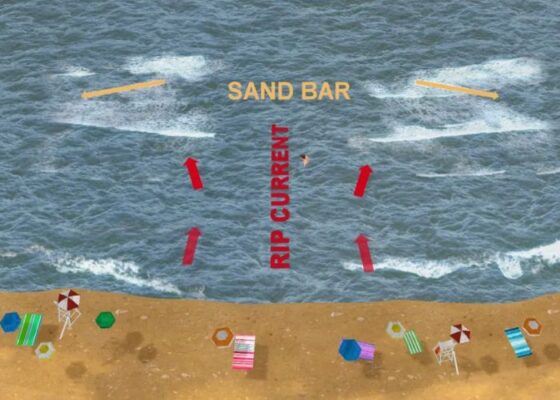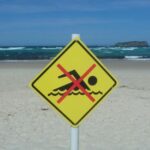As someone who loves the beach and the ocean and has been going to beaches along the Gulf Coast for over seven years, I always make sure to check the weather and water conditions before I go. The National Weather Service sent out a dangerous rip currents report while I was on vacation in Pensacola Beach, Florida. This made me and other beachgoers take extra care. Read below about “Dangerous Rip Currents Alert Issued for Pensacola Beach Visitors”.
Table of Contents
Rip Currents: The Silent Danger Lurking Beneath the Surface
A rip current is a strong channel of water that flows away from the beach and into the ocean, sometimes at speeds of up to 8 feet per second. They can happen on any beach where the waves break, but they happen a lot along the Gulf Coast, where the waves break more often. Rip currents may look calm at first, but they can quickly pull swimmers into deep water, making them a dangerous beach feature that could even kill.
Understanding the Risk- Recognizing Rip Currents

I’ve been to the beach a lot, so I know that rip currents can happen at any time. But they happen more often when there are strong winds from the shore, big waves, and changes in the tide that make the water flow unevenly. Before I go to the beach, I always check the most up-to-date surf reports and advice. When I heard that Pensacola Beach had a high risk rip currents warning from the National Weather Service, I made sure to bring sunscreen and what I knew about rip currents.
Tips To Stay Safe During Rip Currents
Here are some tips I followed and suggest to stay safe during dangerous rip currents alerts:
1. Swim at Beaches with Lifeguards
- Always choose beaches that are monitored by lifeguards, especially on days when the water poses a higher risk.
- Example: In Pensacola Beach, I visited the main public beach near the Gulf Pier, where lifeguard posts are located every few blocks. Lifeguards provide critical oversight and can quickly respond to any emergencies.
2. Consult with Lifeguards for Weather and Water Conditions
- Upon arrival, ask the lifeguards about the current weather and water conditions, especially the risk of rip currents.
- Lifeguards offer real-time information about potential hazards in the water based on their firsthand observations.
- Tip: Always stop by the lifeguard stand and inquire about wave conditions before heading into the water.
3. Recognize Rip Currents
- It’s essential to know the signs of rip currents before entering the water:
- Churning, choppy water
- A change in water color
- A break or gap in the incoming waves
- Debris or sea foam being pulled out to sea
- Stay Alert: Keep an eye out for these indicators, especially if you’re unfamiliar with rip currents.
4. Avoid Swimming in Dangerous Conditions
- If lifeguards are flying purple warning flags or there’s an alert for dangerous rip currents, avoid swimming altogether.
- Instead, enjoy alternative activities like wading, playing in the sand, or splashing in shallow water.
- Remember: It’s never worth risking your life by swimming in hazardous waters.
5. Swim Near Lifeguard Stands
- If you do decide to swim, stay as close to the lifeguard stands as possible.
- Lifeguards can easily monitor you if you’re swimming near their post, ensuring faster response times if something goes wrong.
- Pro Tip: Before entering the water, make eye contact with the lifeguard so they are aware you’re there.
6. Don’t Fight Rip Currents
- If you find yourself caught in a rip current, remain calm.
- Do not try to fight the current; instead, float along with it and signal for help.
- Lifeguards are trained to rescue swimmers from rip currents, so signaling is critical.
- Once you’re free from the current, swim straight back to shore.
7. Know How to Escape a Rip Current
- If no lifeguard is nearby, it’s important to know how to escape a rip current:
- Swim parallel to the shore to get out of the current.
- Once out of the current, swim diagonally back to land.
- Staying calm and conserving energy is key to getting back safely.
- Tip: Always familiarize yourself with this escape technique before swimming.
8. Prepare for Emergencies
- Always be prepared before heading to the beach:
- Carry a cell phone in a waterproof bag.
- Know the number of the nearest emergency call box.
- Be aware of your exact location on the beach.
- Review the beach safety flags system with your group to ensure everyone knows the risks.
By following these essential safety guidelines, you can ensure a safe and enjoyable day at the beach while reducing the risks associated with ocean swimming.
Conclusion
When strong waves break close to land, dangerous rip currents can happen. For example, Pensacola Beach was recently warned about dangerous rip currents. As an experienced beach lover, I always plan ahead and use what I know about rip current safety to make sure I stay safe when I go to a beach with high risk conditions. Even though rip currents can kill, being aware of them and being careful can help you stay safe at the beach.
I hope these tips help everyone planning a beach trip stay smart and safe, whether they go to Pensacola Beach or somewhere else on the ocean. Rip currents can be scary, but if we know about them and respect how strong the ocean is, there are many things we can do to be ready for and deal with them. Always talk to lifeguards and the weather service to find out what the day’s water dangers are. I hope you like reading “Dangerous Rip Currents Alert Issued for Pensacola Beach Visitors”. If we know what to look out for, we can still enjoy the ocean even when rip currents are around. Be smart and safe out there!

With a degree in Environmental Science and over 5+ years of experience in beach travel and exploration, Sophia is the dedicated curator behind fancybeaches.com. Driven by a passion for discovering the world’s most breathtaking beach destinations, Admin combines academic knowledge with firsthand experiences to deliver reliable, authoritative travel advice. Fancybeaches.com is a trusted resource for beach enthusiasts, offering detailed travel guides, safety tips, and sustainable travel practices. Connect me here-n sophiawanders_
Stay connected on Pinterest for expert insights and the latest beach discoveries.





